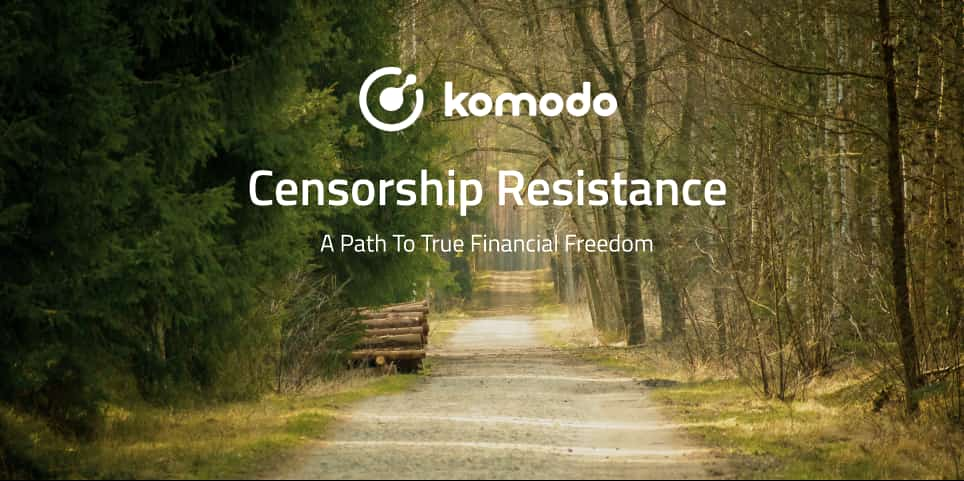The emergence of cryptocurrencies and blockchain technology brings a renewed sense of financial freedom through censorship resistance.
The decentralized nature of crypto assets puts complete control of user funds in the hands of everyday traders, eliminating third-party influence from traditionally dominant financial institutions or governments.
The introduction of decentralized finance has become a major selling point for crypto assets, as finance no longer requires centralized authorities or intermediaries. The resulting surge in crypto adoption, especially in regions with financial instability or harsher financial laws, fueled the idea of "censorship resistance." This solution allows people to sidestep constraints typical of centralized authorities.
What is Censorship Resistance?
In blockchain technology, censorship resistance refers to the average crypto user's ability to make immutable and trustless transactions on a blockchain network without permission from a third party. Since crypto transactions only require nodes on networks powered by cryptographic algorithms to function, unauthorized entities cannot alter any data stored on these decentralized public ledgers.
The most popular example of censorship resistance in the crypto economy is Bitcoin (BTC), which is "censorship-proof" in many ways. However, this feature has stirred concerns among countries with very stringent financial laws, causing them to impose restrictions on crypto transactions. Regardless of these restrictions, many cryptocurrencies are borderless and can still facilitate trades that bypass centralized constraints. The idea that no nation, corporation, or third party has the power to control who can transact or store wealth on the blockchain network is one of the leading value propositions of cryptocurrency and blockchain technology.
Blockchain's immutable nature is an integral part of its censorship resistance feature. This characteristic makes it impossible for anyone to remove or alter transactions once validated on the public ledger. Immutability essentially secures the network from most forms of hacking or other fraudulent activity.
Compared to traditional centralized systems, decentralized platforms have become more desirable because they offer censorship resistance. While centralized exchanges have certain advantages, their vulnerability to control and other forms of authority make them the less desirable option.
A decentralized exchange (DEX) solves this problem by eliminating the need for a centralized third party to hold funds or process trades. In contrast, centralized exchanges allow governments to freeze individual accounts whether or not there is a just cause. As a result, affected people — who may very well be innocent — become cut out of the financial system and lose access to their funds.
Exchange or Transaction Censorship
Exchange or transaction censorship prevents transactions between addresses on crypto exchanges. Central authorities regularly censor crypto wallets for suspicious activity or otherwise. However, censorship resistance makes this difficult on decentralized exchanges. The inherent pseudonymous nature of blockchain wallet addresses makes matching personal individual to a particular crypto address extremely challenging if precautions are taken to mask one's identity. Since blockchain addresses do not contain any personally identifying information, individual transaction censorship can be quite cumbersome.
However, it is essential to note that cryptocurrencies don't always provide absolute censorship resistance, because transactions still require networks controlled by internet service providers (ISPs) or governments. Where shutting down the internet is not an option, governments looking to enforce censorship can block access to cryptocurrency exchange domains or other online crypto infrastructure. With increased internet options, like Elon Musk's Starlink, censoring internet access will also get harder and harder to achieve.
Although transaction censorship on crypto networks is not impossible, it's extremely resource-intensive. Many crypto assets currently operate on majority rule. While the chance is significantly slim, this method puts blockchains at the risk of 51% attacks that take advantage of the distributed method of data verification — a key strength of the Bitcoin protocol and that of many other digital assets. However, this type of attack against Bitcoin would require hundreds of billions of dollars (which could very well be confiscated by the network along the way).
What Is a 51% Attack?
A 51% attack occurs when a single person, group, or organization wields majority control of a blockchain's hash rate to potentially cause network disruptions. In such a case, the attacker would have enough mining power to intentionally remove, alter, or reverse transactions and cause double spend issues.
A successful 51% attack would also allow the hacker to prevent some or all transactions from being validated. Attackers can create a mining monopoly by preventing others from mining.
How Likely Is a 51% Attack?
A 51% attack is not very likely on major blockchains like Bitcoin. Since a distributed network of nodes maintains blockchain networks, all participants cooperate to reach a consensus to confirm and validate transactions.
The distributed nature of blockchains enhances network security and reduces the chance of a 51% attack, especially as the number of nodes and active participants grows.
Networks with larger participation and hash rate are more secure against attacks and data corruption. Smaller networks with reduced participation are more prone to 51% attacks, but solutions like Komodo's delayed Proof of Work (dPoW) offer enhanced protections for networks of any size.
Who Needs Censorship Resistance?
Censorship resistance is essential in many nations where governments enforce rigid laws and restrictions. As long as these restrictions control how individuals store or spend their funds, true financial freedom is unattainable. Therefore, censorship resistance is ideal for anyone who can't freely store wealth or perform transactions without government or third-party influence.
Decentralized exchanges like Komodo Wallet take censorship resistance further by providing a decentralized platform for interested users to conduct peer-to-peer cryptocurrency trading.
Why Can't The Blockchain Be Censored?
Most blockchain designs are decentralized and disintermediated by default. This design makes it virtually impossible for any actor or authority to censor transactions. Manipulating blockchain transactions would require significant control over the network's hash rate, which is almost impossible because of the number of active network participants on each blockchain, especially for large networks.
Another reason why blockchain censorship is almost impossible is the average network's technical design and its use of hash functions to ensure that transactions are irreversible once sent and validated. Regardless of societal or political changes, no government or commanding entity can roll back blockchain data to fit an agenda or personal interest.
Censorship-resistant networks offer users a new and improved way of conducting personal or official business. Without interference from external parties, all participants in the global financial sector can perform transactions and enjoy financial freedom away from prying eyes.
Anyone interested in reducing their chance of transaction censorship can begin by using Komodo Wallet.

